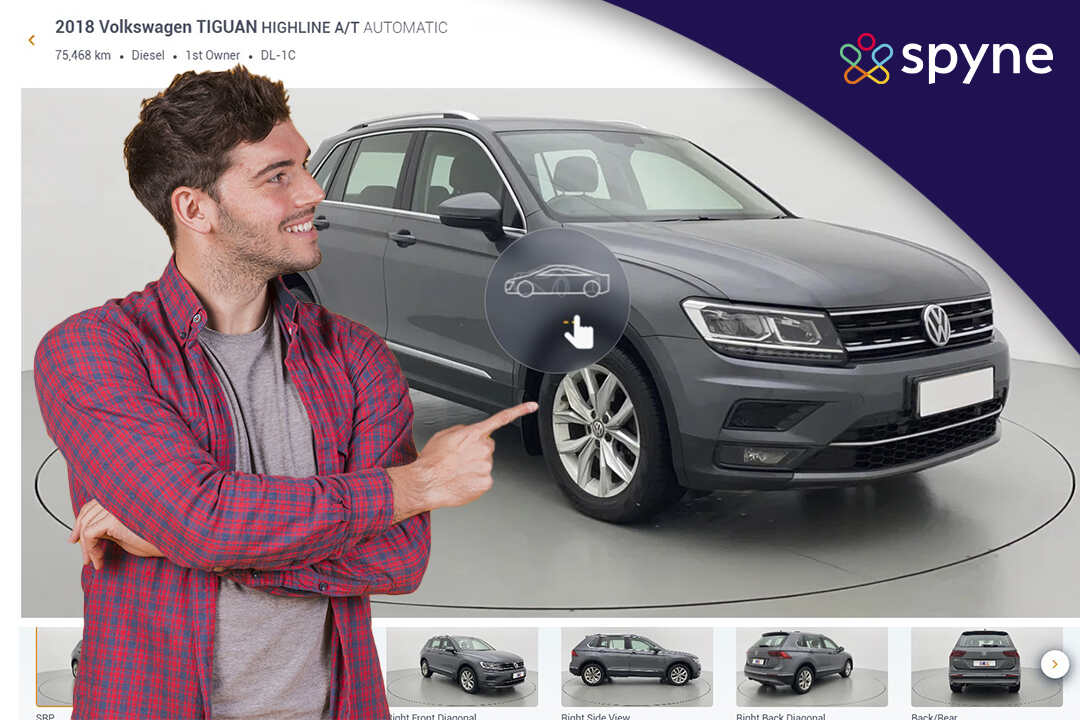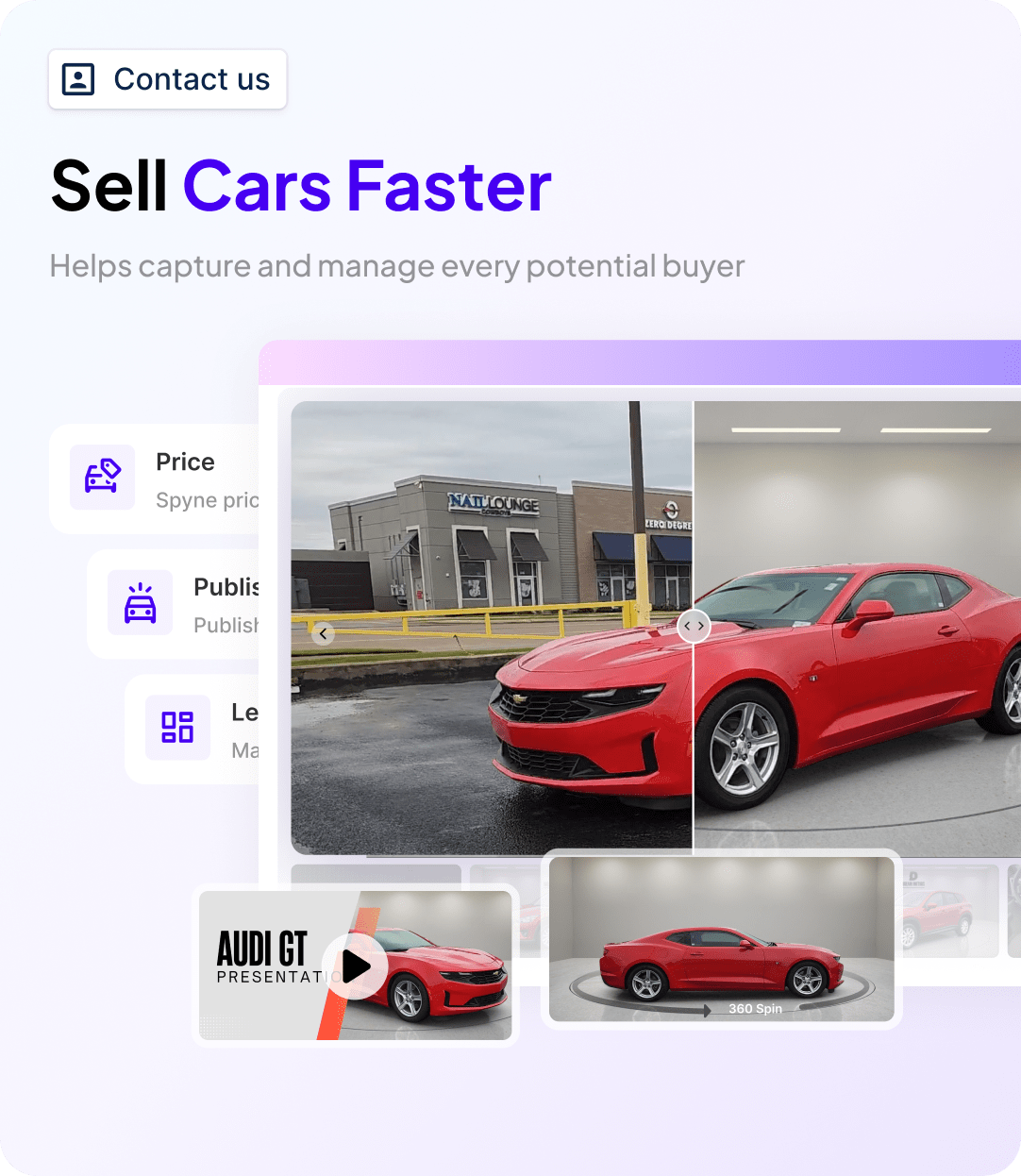Buying a car online is now a popular choice. More people want to shop for cars from home. Automotive ecommerce makes this possible. It gives your customers the tools to explore, compare, and even buy a car from their computer or phone.
If you are planning to take your user car dealership online and get an automotive website design, then this guide will help you.
Here, you’ll learn how automotive e-commerce works, its importance, and some effective strategies. We’ll also cover the latest automotive ecommerce trends in the market, what’s driving change, and what the future holds.
What is Automotive Ecommerce?
Automotive ecommerce is the online buying and selling of vehicles and their parts. It’s a way to buy a car, check financing, or order car parts without visiting a dealership. Everything happens digitally, making car shopping faster and easier. Did you know that the global online car buying market was valued at $304 billion in 2023, and will continue to grow at 12.8 CAGR over the next decade?
But why is it growing so fast? Because of these key features of automotive ecommerce:
- Digital Showrooms: You can explore cars through high-quality images, 360° views, and virtual tours – all at one place.
- Online Financing Options: Check loan terms, estimate trade-in values, and calculate monthly payments online using various calculators.
- Flexible Purchase Options: Choose what works for you—schedule a test drive, pick up your car, or have it delivered.
Automotive e-commerce gives you choices. You can access all the information you need to make the right decision from home.
Now that you know what ecommerce automotive is, let’s explore the trends shaping this new way of shopping.
Key Trends in Automotive Ecommerce
Automotive ecommerce solutions are growing fast because they offer your customers a quick, easy, and convenient way to see your vehicles, and other services. Here are some of the key trends driving this change:
- COVID-19’s Impact on Car Shopping
COVID-19 made it harder for people to visit dealerships like yours. Many turned to online car shopping instead. Now, even with restrictions lifted, people like the ease of browsing and buying from home. In fact, one in four car buyers now choose to make a car purchase online. - Rise of Third-Party Marketplaces, Digital User
Websites like AutoTrader, Cars.com, and Carvana make car shopping more convenient. You can:- Compare prices from different dealers.
- Read customer reviews.
- Explore financing options.
- Digital Showrooms
A digital showroom is like a dealership but online. Here, you can get a closer look at car models. See each car’s interior, exterior, and details—all on your device.
These trends are making automotive ecommerce more popular. Now, car shopping is faster, simpler, and tailored to you.
With these trends in mind, let’s look at the future of automotive industry and its growth predictions for automotive ecommerce.
Market Predictions for Automotive Ecommerce
Experts predict that the automotive e-commerce market is expected to grow significantly over the next decade, with some predicting it could reach as much as $227.93 billion by 2032. The market will expand even further as more people become comfortable buying cars online.
Here are some key predictions:
| Market Prediction | Details |
| U.S. Market Growth | The U.S. automotive e-commerce market will grow as more buyers choose the convenience of online shopping. |
| Global Expansion | The industry will expand in regions like Asia-Pacific, where online shopping is trendy, especially in countries like China and Japan. |
| Main Drivers of Growth | Factors like mobile shopping, digital showrooms, and a demand for faster car-buying options will continue to boost automotive ecommerce. |
These predictions show that online car shopping is here to stay. As digital tools improve, the car-buying experience will become easier and more accessible.
Now that we know where the market is headed, let’s examine the metrics that show how well ecommerce automotive solutions perform.
Critical Metrics for Automotive E-commerce
Tracking the right metrics is essential to determining the success of your automotive ecommerce website. These numbers help you see what’s working and where you can improve.
Essential metrics to track
- Gross Merchandise Value (GMV)
GMV is the total value of all items sold online. It shows how much your e-commerce platform sells over time. - Mobile Commerce Growth
More people shop on their phones, so a mobile-friendly site is crucial. Track the number of your visitors and sales that come from mobile devices. - Average Order Value (AOV)
AOV measures the average amount each customer spends. You can increase AOV by offering extras, like extended warranties or financing options. - Conversion Rate
The conversion rate shows how many visitors take action, like booking a test drive or purchasing. Higher conversion rates mean more engaged visitors. - Net Promoter Score (NPS)
Measures customer loyalty and satisfaction by asking how likely they are to recommend your product to a friend or colleague
| Metric | What It Measures |
| Gross Merchandise Value | Total value of items sold |
| Mobile Commerce Growth | Number of mobile users and sales |
| Average Order Value | Average spend per customer |
| Conversion Rate | Percentage of visitors who take a desired action |
| Net Promoter Score | Measures customer loyalty |
Tip: Use tools like Google Analytics to monitor these metrics. They’ll show you what’s working and where you can improve to drive more sales.
Now that you know the key metrics, let’s explore how automotive e-commerce performs in different regions and B2B sales.
Regional Automotive Ecommerce Trends and B2B Sales
Automotive ecommerce solutions are growing worldwide, but each region shows unique trends. B2B sales are also rising, helping dealerships, repair shops, and part suppliers connect and trade online.
Key Regional Trends
| Region | Trend |
| North America | Growth in online leasing options, purchase in used cars |
| APAC | Rapid expansion in online car sales |
| EMEA | Increased interest in electric, eco-friendly cars |
B2B automotive ecommerce solutions like car dealer website builder are growing, too. Dealerships, repair shops, and suppliers now use online platforms to order parts and vehicles. This trend helps businesses streamline purchases and speed up delivery times, making the supply chain more efficient.
B2B automotive sales benefit regions with large markets, like North America and Europe. Businesses benefit from faster access to parts, making their operations smoother.
With regions adapting quickly, let’s examine innovations that make buying cars online even more accessible, especially in terms of payments and marketing.
Innovations in Ecommerce Automotive Payment and Marketing
In automotive ecommerce, innovative payment options and advanced marketing tools are helping businesses connect with customers in new ways.
Mobile wallets like Google Pay and Apple Pay allow customers to make quick, secure payments. This makes it easy to check out, reducing the chances of dropping off during payment.
Dealerships now use social media platforms like Facebook, Instagram, and Google Ads to reach customers directly. With targeted ads, you can see cars that match your preferences, making it easier to find the perfect vehicle.
Some marketplaces, like Carvana, provide financing options that are easy to understand. These include payment plans and even cryptocurrency payments. With choices like these, you can find the right car and choose how to pay.
Innovative payment and marketing methods make car shopping more accessible and convenient. They add flexibility, letting you pick the options that suit you best.
Now that we’ve covered innovations in payment and marketing, let’s examine future strategies that will continue to shape automotive ecommerce solutions.
Future Strategies in Automotive Ecommerce
As automotive ecommerce grows, new strategies are emerging to meet customer needs. Here are some key strategies shaping the future of car shopping online.
Omnichannel shopping combines online and in-person experiences. For example, you might start browsing cars online and then visit a dealership to see them in person. This approach offers the best of both worlds.
Key benefits of automotive website and omnichannel shopping:
- Flexibility: You can switch between online and in-store experiences.
- Convenience: Schedule test drives or in-store appointments online.
- Consistency: Get the same information and experience, whether online or offline.
Data helps dealerships understand customer preferences. They can tailor recommendations and ads to match your needs by analyzing data. This includes:
- Personalized Ads: Dealerships can show ads based on your past searches or car preferences.
- Product Suggestions: Recommendations for models or features you might like.
- Improved Content: Adjusted content and offers that fit your buying journey.
Subscription models allow you to drive a car without buying it. This option provides more flexibility. You can switch cars or cancel whenever you need to. Companies like Fair offer subscriptions where you pay monthly and don’t commit to long-term ownership.
Benefits of car subscriptions:
- Low Commitment: Drive a car without long-term ownership.
- Easy to Change: Switch to different models based on your needs.
- All-in-One Cost: Covers maintenance, insurance, and other expenses.
As we examine these future strategies, it’s clear that automotive ecommerce is here to stay. Let’s wrap up with a summary of the impact of these changes.
How Spyne Helps in Automotive Ecommerce?
Spyne’s automotive website builder offers a wide range of pre-designed automotive website templates tailored specifically for the automotive industry. These templates are fully customizable, allowing businesses to create a unique and professional online presence that effectively showcases their vehicle inventory.

SEO-Optimized for Visibility
Each website built with Spyne includes built-in SEO tools, ensuring higher visibility in search engine results. This helps automotive businesses attract more organic traffic and engage potential buyers.
Seamless Integration
The platform integrates smoothly with inventory management systems and CRMs, keeping listings up-to-date and operations streamlined. Spyne website builder makes creating a professional, functional, and engaging automotive e-commerce site effortless.
Conclusion
Automotive ecommerce is transforming car buying. It’s making the process faster, simpler, and more flexible. Digital showrooms, targeted ads, and easy payment options help you find the right car from home. As dealerships adopt new strategies, the online car shopping experience will keep improving.
Adapting to these automotive e-commerce trends with automotive website providers means reaching more customers and staying competitive with dealerships. Embracing digital retailing can set them apart in a crowded market.








